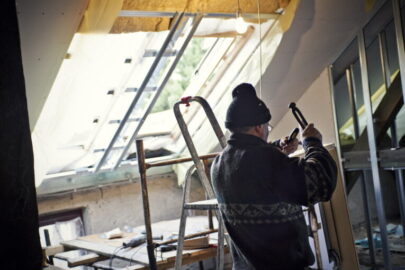The impact of stricter lending criteria combined with people buying their first homes later and middle-aged homeowners staying put has had a major impact on the UK’s housing market. The average turnover of a property has almost trebled since the 1980s from eight years to 23 years according to a report issued earlier this year by the Intermediary Mortgage Lenders Association.
Given the average cost of moving house in the UK continues to increase as house prices keep on rising combined with the persistent shortage of housing stock, it’s unlikely that we’ll see greater fluidity in the market for the foreseeable future.
As a result, many people are choosing to improve their home rather than move.
Converting the loft into a bedroom or extending the property to add much needed space makes a lot of sense. And blame Kevin McLeod and George Clarke if you like, but many improvers are also undertaking their own grand designs to make the most of their amazing spaces which can often involve the use of new building methods and green materials.
These improvements should, of course, add value whenever they make a decision to move. While the pound signs may feature in their thoughts on a projected market value down the line, many improvers fail to consider the impact of such work on the rebuild value of their home. And it is the rebuild value that any insurance claim would pay should the home burn down or be damaged to such a degree that a complete rebuild be required.
The insurance industry reckons that rebuild costs have inflated by around five percent in the past five years. As property prices have generally increased over the same period – and significantly in some parts of the UK – the gap between the rebuild cost and the market value has become even wider. Yet worryingly research shows that around 20 percent of homes in the UK could be underinsured because their policy does not accurately reflect the risk and rebuild value of the property.
Intermediaries and brokers are going to have an increasingly important role to play in assisting their clients who do improve rather than move, particularly if they are remortgaging to fund the work.
It is vital that insurance covers are kept in line with changes to a property. Converting the attic into a bedroom with an en suite will impact the rebuild value. Using materials other than bricks and mortar and tiles and slate could render the property as non-standard in the eyes of some insurers, as could certain types of extensions. It is essential that all information is disclosed so that the insurer has a complete view of the risk.
Remember that despite the changes introduced by the Consumer Insurance (Disclosure and Representations) Act in 2013, anyone who deliberately, recklessly or carelessly gives incorrect information will not be afforded the protection given to consumers by this piece of legislation. An insurer could refuse to deal with a claim or reduce the potential payout.
So if your clients are remortgaging, do take the time to find out if they are planning on any major improvements to their home. The value you could bring to the process could prove priceless.
Brian Coulton is head of sales of Source Insurance
